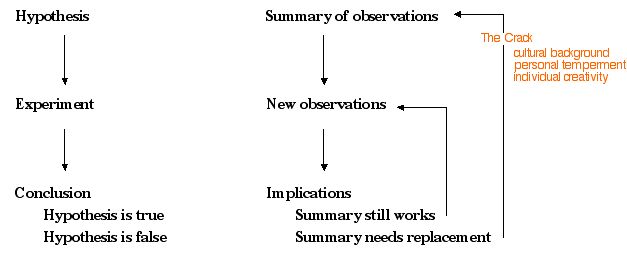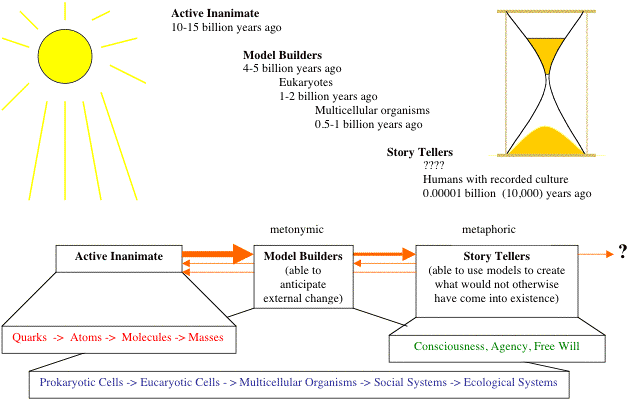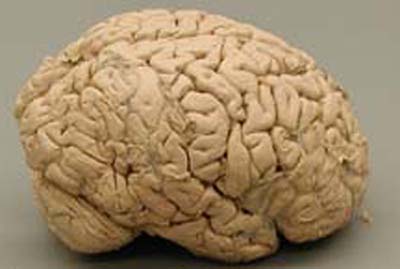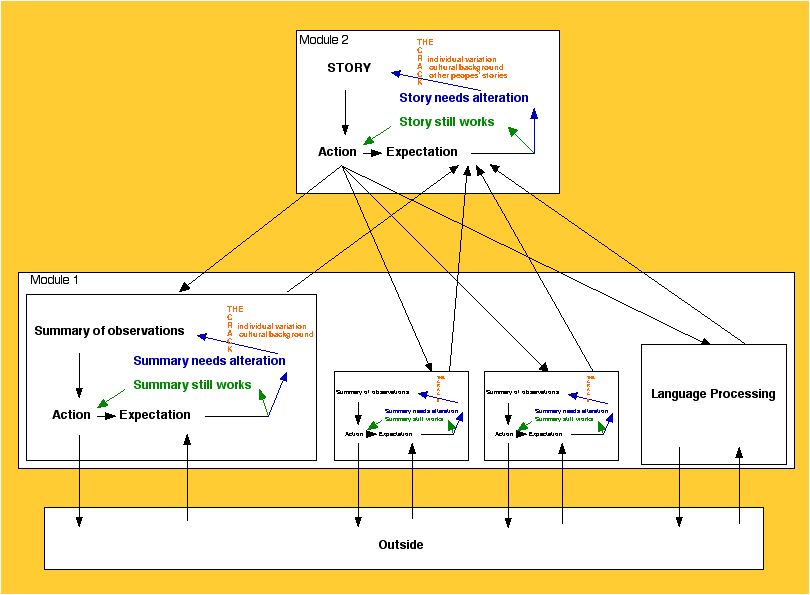Serendip is an independent site partnering with faculty at multiple colleges and universities around the world. Happy exploring!
EvoLit 2011: Evolution beyond biology, with agency and culture?, con.
The challenge: can we usefully see literature, culture, other things in terms related to biological evolution? If we think about literature/culture/other things, what new issues does it raise about a contemporary story of evolution?
Daniel Dennett, empiricist?, foundationalist or non-foundationalist?, fiction or non-fiction?
| Bright/Educated (and sometimes out of control) |
Committed to (a particular kind of) Rigor in Thought | Some Times Too Much So? (and hence oddly timid? as well as limited?) |
| "To put it bluntly but fairly, anyone who today who doubts that the variety of life on this planet was produced by a process of evolution is simply ignorant, excusably ignorant in a world where three out of four people have learned to read and write" (p 46) | "It makes sense to err on the side of greedy reductionism, to try for the simple model before wallowing around in complexities" (p 396) | "If a ... brain were truly capable of non-algorithmic activity, and if we have such brains, and if our brains are themselves the products of an algorithmic process ... an algorithmic process (natural selection in its various levels and incarnations) creates a non-algorithmic subprocess of subroutine, turning the whole process (evolution up to and including ... brains) into a non-algorithmic process after all. This would be a cascade of cranes creating, eventually, a real skyhook! ... The position is, I guess, possible, but ... (p 448) |
The Problem/Solution for Dennett, for us?:
- "In the beginning was the Word ..." ("logos" -> intent, reason, cause)
- Possibility that it is not so (non-foundationalism), that intent/reason/meaning/esthetics were not present at the beginning, leading to ...
- "fears that the wrong answer [to whether evolution is the explanation] would have intolerable moral [and other] implications [no comfort/goodness/personal responsibility]" (Dennett, p 20], ie that things important to us would prove to be shams/illusions
- Dennett's solution ...
Selfish genes, selfish memes, exploration within a fixed landscape/library, emergent meaning/intentionality/morality within that constraint, a semi-inevitable outcome in which individuals, societies, cultures exist but have no causal significance
"Darwin has shown us how, in fact, EVERYTHING is just such a product [of mindless purposeless forces] ... Darwin offers us [a convincing explanation of how God is distributed in the whole of nature]: it is in the distribution of Design through out nature, creating, in the Tree of Life, an utterly unique and irreplaceable creation ... that wonderful wedding of chance and necessity ... [that] just happened to happen, in the fulness of time ... it did make the ivy twine and the sky so blue, so perhaps the song I love tells a truth after all ... it is surely a being that is greater than anything any of us will ever conceive of in detail worthy of its detail ... I can stand in affirmation of its significance." (p 520)
- Paul's problem (maybe yours?) ...
Admiration and awe is all very fine, but I want to be an agent, to MATTER, not only to be shaped by but to shape, to be more than a product of genes and memes.
science itself will teach man... that he himself is something of the nature of a piano-key or the stop of an organ... so that everything he does is not done by his willing it, but is done of itself, by the laws of nature....even if this were proved to him by natural science and mathematics, even then he would not become reasonable, but would purposely do something perverse out of simple ingratitude, simply to gain his point.... the whole work of man really seems to consist in nothing but proving to himself every minute that he is a man and not a piano-key! .... Fyodor Dotoevsky,Notes From Underground, 1864
Can we do better about individuals? about cultures? A different story ...
Step 1. The relation between evolution as a non-foundational narrative story and science
| Linear science | Seriously loopy, story teling science |
 |
|
| Science as successive approximations to Truth
Non-narrative? |
Science as ongoing story telling and story revision: repeated making of observations, interpreting and summarizing observations, making new observations, making new summaries ... individually and collectively Science as skepticism, a style of inquiry that can be used for anything, one which everybody is equipped to to/can get better at/be further empowered by, and contribute to - a way of making sense of what is but even more of exploring what might yet be Narrative? (see The Nature of Science) |
Where in biological inheritance is the "crack"? "personal temperment," "individual creativity," "cultural background"? Are these simply direct consequences of biological inheritance, some of the "traditional details" that need to "perish," "losses to be regretted," or something more? And, if something more, do we need to look elsewhere for them or can they be accounted for within a non-foundational story that Darwin helped initiate?
Looking elsewhere for selves and cultures ...
Can one know all possibilities in advance? must there be "no space beyond the libraries"? Is there a biggest number? (countable and uncountable infinities). An everything? Contra Dennett, a creative role for randomness? Randomness as ignorance or .... ?
Finding selves and cultures (plus) within evolution = emergence

Individuals and cultures (including meaning, intention, esthetics) don't disappear, don't exist in some different parallel world, were not present at the beginning ...
They are instead themselves outcomes of an evolutionary process based in randomness and,
once having come into being,
they in turn become causal influences in that process, using randomness
Humans share with all other living organisms the wherewithal to explore forms of life,
and can do so as well though story telling
The story telling brain as a new development in evolution (a new form that in turn ...)
- Neuronal autonomy and randomness (figure)
- Bipartite brain
- Brain as constructor, deconstructor, reconstructor
- Forms of inquiry
 |
 |
 |
Neocortex gives us the capacity to tell stories, to go beyond experiences, to conceive/explore/bring into existence new worlds, to create meaning using randomness and out of randomness

An unconscious AND a conscious "crack"
Both self and culture can influence story which in turn can influence unconscious
Conscious crack an accelerator of evolutionary exploration
Creates not only form but meaning and esthetics, personality responsibility, free will
Randomness an element of ourselves, of brain function, gives us potential for some degree of agency, ability to create stories that affect our behavior/the world, makes culture more than just biology, collective/shared stories that co-exist/interact with individual ones.,
Narrative non-foundational story telling as an alternative to Dennett
- There is no "everything"
- Randomess makes not only problems but possibilities
- All human experience is story
- Therefore humans (at least) have agency, can bring into existence things other than what follows "mindlessly" from either what exists outside or what one is unconsciously
- Therefore a world (for humans) full of BOTH "hope and possibility" AND "suffering" .... and the ability to decide at any given time what things are ....
There was at the outset neither plan nor intention (nor "word" nor meaning nor morality). There were only very simple things and somewhat random interactions among them. Extended interaction/exploration led to the appearance of more complex things, eventually including ones capable of imagining alternate worlds and acting to try and bring them about. It was this capability, itself continually dependent of some degree of randomness that brought into existence meaning, intentionality (skyhooks), concepts of progress, of good and evil, of purpose. We are hybrid creatures, having both non-foundational emergent parts and transient foundational capability. Used appropriately the two together make possible a richer exploration of possibilities than would otherwise exist. They also create the occupational hazards of premature story tellling and of story reification, both of which can inhibiit explration.
Culture = shared/collective stories that can co-exist with individual stories. This interaction too can both enhance and exhibit exploration.



